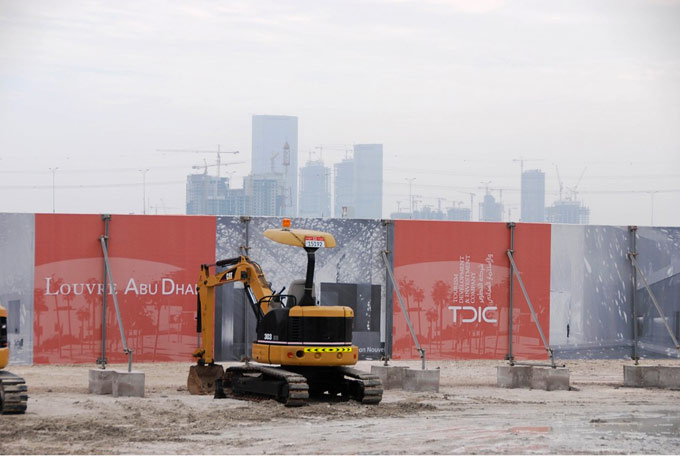
Photo by Hans Haacke, courtesy of Gulf Labor.
Just off the coast of Abu Dhabi, a glimmering enclave of cultural institutions, luxury hotels and beach villas is being erected on Saadiyat Island. New York University (NYU) has inaugurated a new main campus for NYU Abu Dhabi on the “island of happiness” (Saadiyat means “happiness” in Arabic), where it will soon be joined by branches of the Louvre, the Guggenheim and the British Museum.
The Abu Dhabi branches of these premier institutions for art and education have been built by migrant workers laboring and living in less estimable conditions. Contract workers arriving from Bangladesh, Pakistan, India, Sri Lanka and Nepal to build the new structures on Saadiyat are saddled by debt incurred through the exorbitant recruitment fees required under Abu Dhabi’s sponsorship system. Working 11-hour shifts six or seven days a week, they are allegedly paid wages lower than those promised by recruiters, housed in crowded and unsafe rooms and sometimes even stripped of their passports. As the New York Times reported last month in a front-page investigation of conditions for workers building NYU Abu Dhabi, strikes have been met with police repression, imprisonment and deportation.
Gulf Labor—a coalition of artists, activists and writers—has since 2010 demanded that the Guggenheim ensure fair labor practices for migrant workers building its Abu Dhabi branch, and it has partnered with academics pressing NYU to improve conditions for the construction workers hired to build NYU Abu Dhabi. In 2011 hundreds of artists—including Hans Haacke, Alfredo Jaar, Emily Jacir, Barbara Kruger, Shirin Neshat and Walid Raad—joined a boycott of the Guggenheim, preventing its Abu Dhabi branch from acquiring their work for its collection. Gulf Labor has been in regular conversation with the Guggenheim as well as with Human Rights Watch, which issued a stinging report on conditions for workers on Saadiyat in 2009, and members of the group have traveled to Saadiyat to investigate workers’ conditions (producing its own report in March 2014). In recent months, an offshoot of Gulf Labor, G.U.L.F. (Gulf Ultra Luxury Faction), has initiated a string of creative protests within the Guggenheim in New York, dropping “1%” bills into its rotunda and projecting phrases like “Art Is Not a Luxury” onto the building’s facade using Occupy Wall Street’s Illuminator.
In this episode of Forms of Life, host Nato Thompson speaks with the writer and artist Naeem Mohaiemen; Andrew Ross, NYU professor of social and cultural analysis; and Laura Diamond Dixit of the Gulf Labor–affiliated group Who Builds Your Architecture?
Forms of Life is a monthly podcast hosted by Creative Time’s chief curator, Nato Thompson. Guests are culture makers whose work posits new ways of looking at political realities. By addressing a wide variety of issues—such as alternative economies, calcified political structures and new forms of collective living—or simply by being a thorn in the side of normality, Forms of Life interviews provide an opportunity to think counterintuitively about social conditions faced by people around the world.

